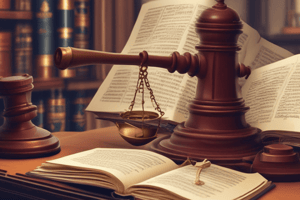Podcast
Questions and Answers
What does Salmond's Pigeon Hole Theory imply about tortious liability?
What does Salmond's Pigeon Hole Theory imply about tortious liability?
- All wrongful acts are considered torts.
- Tortious liability arises only from specific wrongs. (correct)
- Every tort must be uniquely named.
- Plaintiffs can claim damages for any wrongdoing.
Which of the following best describes Winfield's preference regarding the law of torts?
Which of the following best describes Winfield's preference regarding the law of torts?
- Torts are limited to specific legal definitions.
- Any wrongful act can lead to liability in tort. (correct)
- Only named torts can result in liability.
- There are universal standards for tortious behaviour.
What legal principle was recognized in Ashby v. White?
What legal principle was recognized in Ashby v. White?
- A plaintiff must name the tort to claim damages.
- Torts must be defined by specific legal terms.
- Every injury must have a corresponding tort. (correct)
- Tort liability is always strict or absolute.
What does Winfield suggest about lawful justifications in tort?
What does Winfield suggest about lawful justifications in tort?
According to Salmond, what happens if a plaintiff's case does not fit into any defined tort?
According to Salmond, what happens if a plaintiff's case does not fit into any defined tort?
What does the phrase 'ubi jus ibi remedium' imply?
What does the phrase 'ubi jus ibi remedium' imply?
What aspect of tort law does strict liability pertain to?
What aspect of tort law does strict liability pertain to?
Winfield's broader outlook on the law of tort suggests what regarding categorization?
Winfield's broader outlook on the law of tort suggests what regarding categorization?
Flashcards are hidden until you start studying
Study Notes
Understanding the Law of Tort vs. Law of Torts
- The debate centers around whether "Law of Tort" implies that every wrongful act without justification is a tort or "Law of Torts" suggests a collection of specific wrongs establishing liability.
Salmond's Perspective
- Salmond posits that no general principle of tortious liability exists; liability arises only if a wrongful act fits into predefined categories, termed "pigeon holes."
- This notion, known as the Pigeon Hole Theory, asserts that if a case does not fit into an established category, no tort has occurred.
Winfield's Preference
- Winfield supports the idea of "Law of Tort," arguing any wrongful act can result in liability regardless of whether it is categorized under specific names like assault or slander.
- He emphasizes that liability exists unless the defendant can provide a lawful justification for their actions.
Legal Precedents and Perspectives
- The 1702 case Ashby v. White favored Winfield's theory, establishing the principle ubi jus ibi remedium, meaning where there is a right, there is a remedy.
- Winfield later acknowledged that while the second theory of specific wrongs suffices for practical cases, the first theory allows for broader interpretation in ensuring comprehensive justice.
Key Concepts
- Strict Liability/Absolute Liability is an emerging principle indicating that entities can be held liable without needing to establish negligence or fault in certain situations.
- The evolution of these theories reflects ongoing discussions in the legal field about the nature and scope of tort law.
Studying That Suits You
Use AI to generate personalized quizzes and flashcards to suit your learning preferences.




